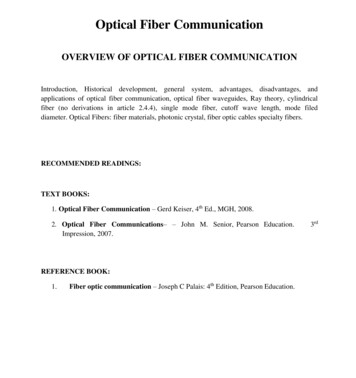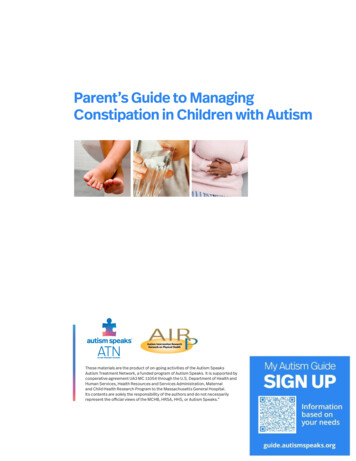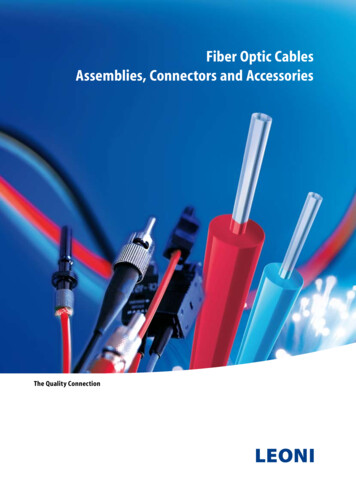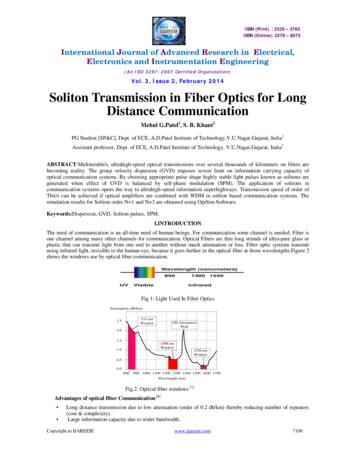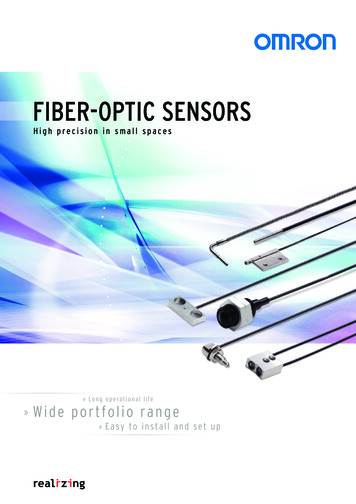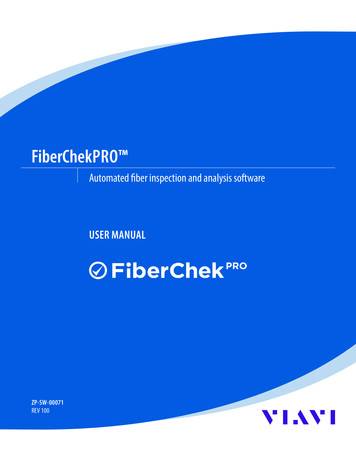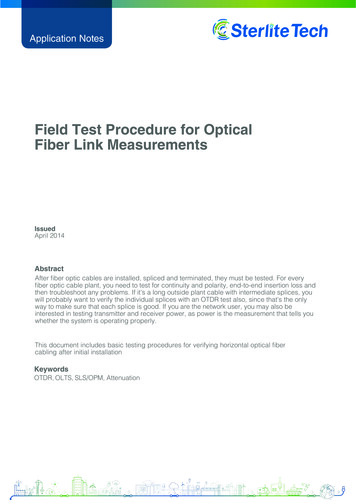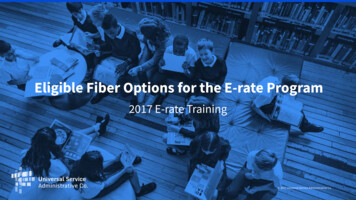
Transcription
Eligible Fiber Options for the E-rate Program2017 E-rate Training 2017 Universal Service Administrative Co.1
AGENDA 2017 Universal Service Administrative Co. Identifying E-rate eligible fiberservices and charges Installment Plans and State MatchFunds (Special Construction) Requesting proposals for fiberservice options (FCC Form 470) Evaluating cost-effectiveness offiber service options Preparing a fiber funding request(FCC Form 471) Service delivery deadlines andextensions (FCC Form 500) Service provider’s role in processand FCC Form 471 Tips2
E-RATE ELIGIBLE TRANSPORTLeased Lit FiberLeased Dark FiberA fiber-based broadbandservice where the serviceprovider owns andmanages the network, andthe E-rate applicant pays arecurring fee to have datatransported over thenetwork.The E-rate applicant leasescapacity (i.e., a specificnumber of strands) on aservice provider-ownedand maintained fibernetwork. The applicantpays separately formodulating equipment tolight the fiber in order totransmit data over thatfiber.Self-ProvisionedNetworks*Complete applicantownership of a high-speedbroadband network. Theapplicant hires a vendor toconstruct the network or aportion of the network,and thereafter owns andmaintains that network orportion of the network,including all of the fiberstrands and conduit.*Note: Although included as a fiber option, applicants may seek support for selfprovisioned networks using technologies other than fiber, such as cable or Microwave. 2017 Universal Service Administrative Co.3
E-RATE ELIGIBLE FIBER AND SELF-PROVISIONED NETWORK CHARGESApplicants may request E-rate support for the following charges (by type of service):Leased Lit FiberLeased Dark Fiber Monthly recurringcharges Recurring dark fiberlease or IRU payments Special constructioncharges Maintenance andoperations charges Basic installationcharges Special constructionchargesSelf-ProvisionedNetworks Maintenance andoperations charges Special constructioncharges Network equipment Basic installationcharges Network equipment 2017 Universal Service Administrative Co.4
SPECIAL CONSTRUCTION OVERVIEW Special construction charges are the upfront, non-recurring costs ofdeploying new fiber or upgraded network facilities to eligible entities. Special construction charges eligible for Category One (C1) supportconsist of three components: Construction of network facilities; Design and engineering; and Project management. Applicants may seek funding for special construction charges inconnection with leased lit fiber, leased dark fiber, and selfprovisioned networks. 2017 Universal Service Administrative Co.5
SPECIAL CONSTRUCTION OVERVIEWSpecial construction charges do not include: Charges for Network Equipment necessary to light fiber (i.e.,modulating electronics and other equipment necessary to make aC1 service functional), or maintenance and operations (M&O) ofthe fiber. If seeking bids for Network Equipment and/or M&O in relation to LeasedDark Fiber service, bids for these services must be requested on the sameFCC Form 470 as the Leased Dark Fiber service. Funding requests for network equipment and M&O costs associated withlighting Leased Dark Fiber must be included in the same FCC Form 471 thatrequests support for the Dark Fiber Lease or IRU. 2017 Universal Service Administrative Co.6
SPECIAL CONSTRUCTION OVERVIEW Special construction charges incurred up to six months prior to thebeginning of the funding year (i.e., January 1) are eligible for supportif: Construction begins after selection of a service provider pursuant to a validcompetitive bidding process; A Category One recurring service depends on the installation of theinfrastructure; and Actual service start date is on or after the start of the funding year (i.e., July 1).Note: Applicants that start construction early, before a funding request isapproved, assume the risk that the request will be denied or that a reducedcommitment amount is approved. 2017 Universal Service Administrative Co.7
SPECIAL CONSTRUCTION OVERVIEW Milestone Payments Applicants may submit invoices for special construction charges at anypoint during the funding yearNote: Applicants may not receive E-rate support for any recurring chargesincurred before the start of the funding year (i.e., July 1). 2017 Universal Service Administrative Co.8
SPECIAL CONSTRUCTION OVERVIEWTo be eligible for E-rate discounts forspecial construction charges – whetherfor leased lit fiber, leased dark fiber, ora self-provisioned network – specialconstruction must be completed intime for the fiber to be lit (or for a selfprovisioned network involving anothertechnology to be in use) by the end ofthe relevant funding year (i.e., June30). If this June 30 deadline is not met,the special construction charges willnot be eligible for support underprogram rules. 2017 Universal Service Administrative Co.9
INSTALLMENT PAYMENTS FOR SPECIAL CONSTRUCTION Applicants can enter into installment payments plans to paythe non-discounted share of costs for special construction. Applicants must indicate their interest in installment paymentplans on their FCC Form 470. Service providers are not obligated to offer installmentpayment plans to applicants. 2017 Universal Service Administrative Co.10
INSTALLMENT PAYMENTS FOR SPECIAL CONSTRUCTION If a service provider chooses to offer an installment paymentplan, they must disclose all material terms, including theinterest rate and the term of the payment plan. Payment plans may not exceed four (4) years. Interest and finance charges are not E-rate eligible charges and must bededucted from the funding request. 2017 Universal Service Administrative Co.11
ADDITIONAL DISCOUNT TO MATCH STATE/TRIBAL FUNDINGFOR SPECIAL CONSTRUCTION If a state provides eligible schools and libraries with funding for specialconstruction charges for high-speed broadband that meets the FCC'slong-term connectivity targets, the E-rate program will increase anapplicant's discount rate for these charges up to an additional tenpercent to match the state funding on a one-to-one dollar basis. Statefunding can be funds authorized directly by a state legislature orprovided by one or more state agencies. For Tribal schools and libraries, the E-rate program will also matchspecial construction funding provided by states, Tribal governments, orother federal agencies. 2017 Universal Service Administrative Co.12
ADDITIONAL DISCOUNT TO MATCH STATE/TRIBAL FUNDINGFOR SPECIAL CONSTRUCTION State Match Eligibility Requirements: The broadband service must meet the FCC's long-term targets. The funding must be from an eligible source. The terms and conditions associated with the state funding must notconflict with E-rate rules. The total amount of support, including matching funds, may notexceed 100 percent of the cost of the project. State match funds may not be applied to any other cost – applicantsshould create separate funding requests on their FCC Forms 471 forspecial construction. 2017 Universal Service Administrative Co.13
SEEKING COMPETITIVE BIDS BY SUBMITTING THE FCC FORM 470 Applicants initiate the required competitive bidding process bysubmitting the FCC Form 470 in E-rate Productivity Center(EPC). In EPC, the FCC Form 470 has a drop-down menu of eligibleservices; applicants must select the services for which theywould like to seek bids. 2017 Universal Service Administrative Co.14
FIBER SPECIFIC COMPETITIVE BIDDING RULES Leased lit fiber: If an applicant is only interested in seekingbids for leased lit fiber, they may do so by posting an FCCForm 470 in EPC that only specifies leased lit fiber as therequested service. (Utilize the “Leased Lit Fiber” drop-downoption in EPC when submitting the FCC Form 470.) Leased dark fiber: Program rules require applicantsconsidering a Leased Dark Fiber solution for their connectivitymust also request bids for a Leased Lit Fiber solution. (Utilizethe “Leased Dark Fiber and Leased Lit Fiber” drop-downoption in EPC when submitting the FCC Form 470.) 2017 Universal Service Administrative Co.15
FIBER SPECIFIC COMPETITIVE BIDDING RULES Self-provisioned network: Applicants that are considering aSelf-Provisioned Network solution for their connectivity needsto must also request bids for services provided over thirdparty networks. (Utilize the “Self-Provisioned Network andServices Provided Over Third-Party Networks ” drop-downoption in EPC when submitting the FCC Form 470.) 2017 Universal Service Administrative Co.16
FCC FORM 470 AND REQUESTS FOR PROPOSALS (RFPS) The FCC Form 470 and requests for proposals (RFPs) should provideenough information to solicit comprehensive proposals fromservice providers, but not so much information that the applicantstates or implies a preference for a particular connectivity solution,a particular construction route, or particular method ofconstruction. If posting an RFP for multiple service types make certain that yourRFP: Addresses all of the broadband solutions services for which you are seekingbids. Does not indicate a preference for one broadband solution over another. 2017 Universal Service Administrative Co.17
FCC FORM 470 AND REQUESTS FOR PROPOSALS (RFPS) Although the E-rate rules do not specifically require applicants toprepare a separate RFP for any eligible service, applicants seeking bidsfor leased dark fiber services, self-provisioned networks, or the "Other"option will need to upload an RFP in EPC. 2017 Universal Service Administrative Co.18
COST-EFFECTIVENESS REQUIREMENT Applicants are required to demonstrate that they selected the mostcost-effective service offering. When an applicant considers bids for the fiber options, the costeffectiveness analysis should include: A comprehensive explanation of the cost breakdown of the chosen serviceoption over the other available service options. An evaluation of the expected useful life of the facility, and compare thecombined upfront and recurring costs associated with the service. If considering a leased dark fiber options, this would include, for example,comparing the charges associated with leasing the fiber, costs for anymodulating equipment, and M&O costs with the cost of leased lit fiber optionsover a comparable period of time. 2017 Universal Service Administrative Co.19
COST-EFFECTIVENESS FOR FIBER SERVICE OPTIONS The comparison time period must be defensible and alignedwith the applicant’s anticipated use of the assets. Decisions must have a tangible basis and the result should bereasonable. Include explanations on any assumptions made during theevaluation, such as expected useful life, frequency ofequipment refreshes, etc. 2017 Universal Service Administrative Co.20
COST-EFFECTIVENESS FOR FIBER SERVICE OPTIONS Service Specific Considerations for Cost-Effectiveness Self-Provisioned Networks: Consider all costs of owning, operating, andmaintaining a network (e.g., recurring fees for maintenance andoperations, network equipment, equipment refreshes). Leased Dark Fiber: Consider all of the costs of leasing, lighting,maintaining, and/or operating the dark fiber. Leased Lit Fiber: Comparison should project demand for bandwidthover the comparison period and how costs of bandwidth may vary overtime. 2017 Universal Service Administrative Co.21
PREPARING YOUR FUNDING REQUEST Applicants will be asked to provide an explanation of the costeffectiveness of their service selection. Provide line item level details on any charges related to the service. Work with your service provider to understand and be able to explainthe reasonableness and need for any associated costs. Examples: Pole make ready cost (aerial) Large number of splices Large quantity of hand holes or vaults (buried) Provide a map utilizing GIS data as part of the cost-per-foot evaluation. Communicate the time frame when the investment of USF will yieldcost savings. 2017 Universal Service Administrative Co.22
COST-ALLOCATION: FIBER Subject to the same cost-allocation requirements as all E-rateeligible services and funding requests: E-rate funds may only be used to pay for services and products used byeligible entities for an eligible purpose (i.e., a primarily educationalpurpose). All costs associated with fiber installed for use by an ineligible entity orfor an ineligible purpose must be allocated out of a specialconstruction funding request. Includes all costs above and beyond what would be incurred if only thefiber required to serve the applicant were installed. 2017 Universal Service Administrative Co.23
COST-ALLOCATION: FIBER A cost-allocation requires a clear delineation of costs.Must be based on a reasonable, tangible basis that reaches arealistic result.Cost-allocations must be supported by documentation.Reminder: All fiber and facilities installed as part of a selfprovisioned network must be owned by eligible schools/librariesand may not be used by other entities (i.e., resold). Limitedexception per program rules for consortia 2017 Universal Service Administrative Co.24
COST-ALLOCATION: FIBER Special construction charges are only eligible for support ifthe new fiber is lit by the end of the funding year: Excess fiber strands (i.e., fiber strands that are not lit for the applicant’suse in the same FY) may be installed for the applicant’s exclusive futureuse. Cost of the fiber strands not lit within that FY must be allocated out ofthe funding request. Remaining special construction charges need not be cost-allocated. Recurring charges of using the excess fiber strands will be eligible forsupport in the funding year that they are lit for the applicant’s use. 2017 Universal Service Administrative Co.25
COST-ALLOCATION: FIBER EXAMPLES Example 1: Leased lit fiber or leased dark fiber providerinstalls 12-strands in fiber run to a large school district huband wants to add 36 additional strands for its own ineligibleuse, resulting in additional labor costs (e.g., splicing) andplant costs (e.g., larger termination boards, additionalhandholes).Result: Cost of 36 additional fiber strands and all associated incrementalincreases in costs (e.g., the additional labor/outside plant costs) abovewhat would be incurred if only the 12-strands of fiber were installed mustbe allocated out of the applicant’s special construction funding request. 2017 Universal Service Administrative Co.26
COST-ALLOCATION: FIBER EXAMPLES Example 2: School district seeks to install 48 strands of fiberin a self-provisioned network, only plans to light 12 strandswithin the FY. The remaining 36 stands will be reserved for theapplicant’s exclusive future use.Result: Applicant must allocate the cost of the excess fiber strands out ofthe funding request, but no portion of the remaining special constructioncosts. 2017 Universal Service Administrative Co.27
COST-ALLOCATION: FIBER EXAMPLES Example 3: School district seeks to install 48 strands of fiberin a self-provisioned network that will be used by the schooldistrict, the State Department of Social Services, and a nonprofit organization.Result: Funding request denied. Self-provisioned networks must beowned by eligible schools and libraries, which may not resell E-ratesupported services and products. 2017 Universal Service Administrative Co.28
COST-ALLOCATION: FIBER EXAMPLES Example 4: The applicant is an E-rate consortium comprisedof schools and municipal entities. It seeks to self-provision anetwork that will be owned entirely by the schools, but willalso be used by the municipal entities.Result: The cost of all fiber strands used by the municipal entities mustbe allocated out of the funding request, as well as any additional specialconstruction costs incurred because of the installation of those fiberstrands (e.g., any increased labor charges, increased plant costs, 100% ofthe costs of any laterals built to the municipal entities). 2017 Universal Service Administrative Co.29
SPECIAL CONSTRUCTION FUNDING REQUEST INFORMATION Tips for entering responses to the highlighted fields when submitting anFCC Form 471 seeking special construction support. Total Project Plant Route Feet - This measure only accounts for newlydeployed fiber, and should not include any existing fiber. (e.g., If the totalproject covers 150,000 feet but 5,000 feet is existing infrastructure thatwill be spliced to the newly deployed fiber, the response to this fieldwould be 145,000 feet.) 2017 Universal Service Administrative Co.30
SPECIAL CONSTRUCTION FUNDING REQUEST INFORMATION Average Cost Per Foot of Outside Plant - This will equal the “Total SpecialConstruction Charges” divided by “Total Project Route Feet.” (See theexample from Item 1: If total special construction charges are 5,000,000.00, then the response in this field should be 5,000,000.00/145,000 feet 34.48/foot.) 2017 Universal Service Administrative Co.31
SPECIAL CONSTRUCTION FUNDING REQUEST INFORMATION Total Strands - This is the total number of strands installed at the time ofconstruction. (If the build is segmented into a backbone segment with a 48strand cable and a lateral segment with a 12 strand cable, then the response forthis field would be 60 strands. You can provide additional explanation in theNarrative field.) 2017 Universal Service Administrative Co.32
SPECIAL CONSTRUCTION FUNDING REQUEST INFORMATION Number of E-rate Eligible Strands - This is the total number of strands that (a) willbe lit within the current funding year and (b) are for the exclusive use of eligible Erate entities. (See the example from Item 3. If 12 strands are being lit in thebackbone segment and 8 strands in the lateral segment for the exclusive use ofthe E-rate eligible entities, then the response to this field would be 20 strands.) 2017 Universal Service Administrative Co.33
NETWORK EQUIPMENT FUNDING REQUEST INFORMATION If you do not see an option in the drop-down menu that describes yourequipment within the “Type of Fiber Network Equipment”, use the “Other” choiceand enter the description in the “Enter the Type of Fiber Network Equipment”field. This will provide USAC with an accurate description of the equipment andhelp to streamline the review process. (For example, if your Network Equipmentis a “Transceiver” use the “Other” choice and enter the description of“Transceiver.”) 2017 Universal Service Administrative Co.34
INSTALLATION PERIOD (ALL C1 NON-RECURRING CHARGES) Installation of all Category One non-recurring services (including specialconstruction charges) may begin six months prior to the July 1 start ofthe funding year (i.e., or after January 1) if the following conditions aremet: Construction begins after selection of the service provider pursuant to a validcompetitive bidding process. A Category One recurring service must depend on the installation of theinfrastructure. The actual service start date for that recurring service is on or after the start of thefunding year (July 1). 2017 Universal Service Administrative Co.35
SERVICE DELIVERY DEADLINES (RECURRING CHARGES) To be eligible for E-rate discounts for recurring charges relatedto an eligible Category One service, the service must be in useby the end of the relevant funding year (i.e., June 30). If thisJune 30 deadline is not met, the recurring charges will not beeligible for support under program rules. There is noextension available for recurring charges. 2017 Universal Service Administrative Co.36
SERVICE DELIVERY DEADLINES (RECURRING CHARGES) Applicants may not receive E-rate support for any recurring chargesincurred before the start of the funding year (i.e., July 1). Applicants may only receive E-rate support for recurring charges forleased lit fiber services delivered within the funding year. Applicants may not receive E-rate support for recurring charges forleased dark fiber until the fiber is lit. Applicants may not receive E-rate support for recurring chargesassociated with a self-provisioned network until the network isconstructed and is in use. 2017 Universal Service Administrative Co.37
SERVICE DELIVERY DEADLINES (SPECIAL CONSTRUCTIONCHARGES) Applicants may only request E-rate support for specialconstruction charges related to leased lit fiber and leased darkfiber if the fiber is lit within the same funding year (i.e., byJune 30) as the funding request. Applicants may only receive E-rate support for specialconstruction charges for a self-provisioned network if thenetwork is constructed and is in use by the end of the samefunding year as the funding request. 2017 Universal Service Administrative Co.38
SPECIAL CONSTRUCTION DEADLINE EXTENSION Applicants may request a one-year extension to complete specialconstruction and light the fiber (or use a self-provisioned network ifanother technology is employed), if the applicant can demonstratethat construction was unavoidably delayed due to weather or otherreasons. Examples of circumstances causing unavoidable delayinclude: Unforeseen weather event or pattern resulting in saturated or frozen ground,which prevents work; Natural disaster causing an unavoidable delay; Scheduled delivery of required plant components do not arrive; USAC issues an FCDL too late for applicant to complete special construction andlight fiber by the end of funding year. 2017 Universal Service Administrative Co.39
SPECIAL CONSTRUCTION DEADLINE EXTENSION Note: To obtain a one-year extension based on an unforeseen,unavoidable construction delay, applicants must submit an extensionrequest to USAC before the end of the funding year (i.e., June 30). 2017 Universal Service Administrative Co.40
SERVICE PROVIDER ROLE DURING THE APPLICATION ANDREVIEW PROCESS After the competitive bid process has concluded and a contract is enteredinto, service providers can: Assist applicants in preparing their FCC Form 471/Funding Request(s). Speak directly to and respond to Program Integrity Assurance (PIA) questions.(Applicants should still be aware of any correspondence.) Assist with explaining why your service offering is cost-effective and providing anyrequired cost-allocation documentation. Service providers can requestconfidentiality of their data. (See, e.g., 47 C.F.R. §§ 0.457 and 0.459.) Work with the applicant to provide sufficiently detailed responses to PIAinformation requests. 2017 Universal Service Administrative Co.41
Q&A SESSION 2017 Universal Service Administrative Co.42
THANK YOU! 2017 Universal Service Administrative Co.
Dark Fiber service, bids for these services must be requested on the same FCC Form 470 as the Leased Dark Fiber service. Funding requests for network equipment and M&O costs associated with lighting Leased Dark Fiber must be included in the same FCC Form 471 that requests support for the Dark Fiber Lease or IRU.



